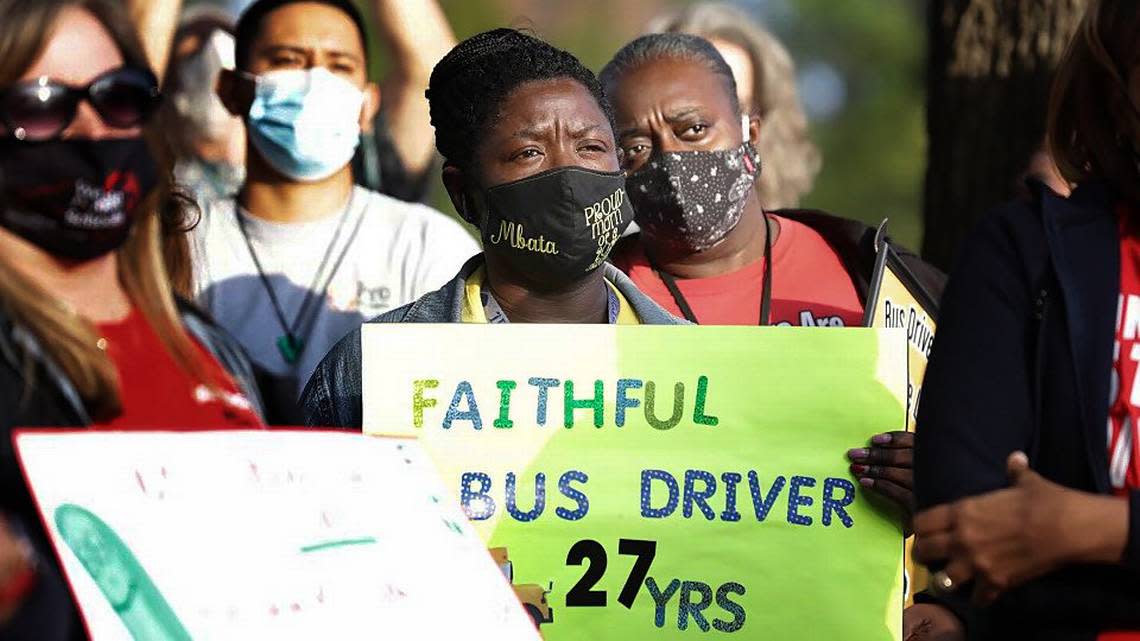Wake school board wants to boost employee raises. Where will the money come from?
Wake County school board members want to boost employee raises this year but are split over how to pay for them.
Superintendent Robert Taylor wants to ask the Wake County Board of Commissioners this year for a $58.3 million increase in local funding. Multiple school board members said Tuesday that the 3% raises for school employees in Taylor’s budget aren’t enough.
The question facing the board is whether to pay for higher raises by cutting the budget or asking for more than the $58.3 million. The school board will continue to review the budget plan before sending it to commissioners.
“We want a budget that reflects our priorities, and our priorities are taking care of our staff and the professionals that are taking care of our children everyday,” school board chair Chris Heagarty said during the budget work session. “I know we’ll have to make some tough choices and some tough decisions because the money has to come from somewhere.”
Dealing with the loss of COVID dollars
Taylor unveiled his $2.2 billion operating budget last month. He’s asking commissioners to provide $702.6 million — an 8% increase over current funding levels.
School administrators identified several needs, including replacing the loss of one-time federal COVID aid and keeping up with mandated state increases.
Among the items in the budget are:
▪ Keep the behavioral staff positions funded by COVID dollars — $13.8 million.
▪ Match state’s share of projected 3% increased in salaries — $9.9 million.
▪ Increase in funds transferred to charter schools due to their increased enrollment — $9 million.
▪ Keep the permanent substitute teacher position at each school paid by COVID dollars — $7.6 million.
▪ Opening of new schools and school changes — $4 million.
▪ Keep the extended care learning labs for bus riders who are on campus due to bus delays, that had been paid for with COVID aid — $2.5 million.
‘We’re going to lose teachers’
Taylor did not propose going above the 3% raises the state is expected to provide this year. Citing the other budget needs, he didn’t recommend this year following the district’s multi-year plan for pay raises.
In recent years, Wake has raised the minimum salaries for its lowest paid employees — such as teacher assistants, cafeteria workers, custodians and secretaries — from $11.80 an hour to now $17 an hour.

The proposed budget wouldn’t provide $7.7 million needed to raise the minimum salary to $18 an hour or to give those support staff a 4% raise.
The proposed budget also doesn’t include $7.3 million to give teachers a 4% increase to the local salary supplement. Wake uses local dollars to supplement the base pay from the state.
“With the cost of living increasing and inflation that the way it is, 3% from the state is not enough,” said board member Tyler Swanson. “I’m concerned we’re going to lose teachers and staff from this.”
Swanson suggested that the staff provide bigger raises by taking it from the $2.5 million earmarked for the learning labs.
Swanson also suggested using some of the $7.6 million that would go toward providing substitute teachers. He said they should prioritize keeping the substitute positions at high-poverty schools.
Should the school board ask for more than $58 million?
Swanson and board member Cheryl Caulfield said they would not support going above the $58.3 million funding increase proposed by Taylor.
“Realistically in my life, when you can’t afford something, you’ve got to turn around and say, ‘You can’t do this anymore. You’ve got to take this away,’” Caulfield said.
Other board members were not so adamant about sticking to that figure.
“I’m quite frankly interested in raising the ask,” said board member Lynn Edmonds. “Not by a lot. But our duty as board members to the Wake County Public School System is to ask for what we need.”
Board vice chair Monika Johnson-Hostler said the hard decisions they’ll make include how the budget could make it even more difficult for school employees to afford to live in Wake County.
“I have to acknowledge there are a large number of our educators who can’t afford to live in this county,” Johnson-Hostler said. “So any ask we make I have to be clear I’m also potentially asking to raise their taxes.”
Speakers debate budget plan
During Tuesday’s budget public hearing, members from the Wake County chapter of the N.C. Association of Educators urged the board to increase the pay raises.
Wake NCAE members feel providing higher raises to all employees is more important than even keeping the positions that were funded by the COVID dollars, according to Christina Spears, the group’s president.
“If you do the brave thing asking for what we need in this dire moment, we will fill the commissioners’ chambers with workers, parents, community members and taxpayers urging them to fund your request,” Spears told the school board.
But Becky Lew-Hobbs of Moms for Liberty questioned how academic performance has dropped, despite increases in funding.
Since the 2017-18 school year, local funding has risen by 49.5%, or an increase of more than $213 million a year. During that same time period, enrollment has dropped 434 students to 159,995 this school year.
Like schools across the state, Wake County saw performance plummet during and after the pandemic when districts switched to remote instruction.
But North Carolina has slowly been making up for the learning loss in reading and math. A study released in February said some North Carolina school districts, including Wake County, are back to pre-pandemic levels in those subjects.
“Spending more money does not equate to a quality education so stop redirecting resources to positions, programs and contracted services that don’t provide the quality education to our students,” Lew-Hobbs told the board.
